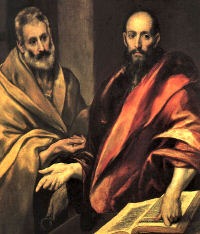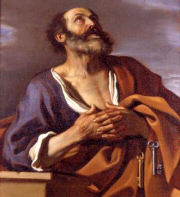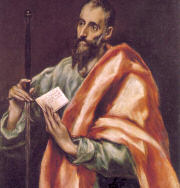Saints Peter and Paul are the principle pillars of the Church founded by Christ. Saint Peter was chosen by Christ to be his first Vicar on earth; he was endowed with powers ofthe keys of the kingdom of heaven (Mt 16:13-19) and charged with the role of Shepherd of Christ's flock (Jn 21:15-17). In St. Peter and his sucessors, we have a visible sign of unity and communion in faith and charity. Divine grace led St. Peter to profess Christ's divinity.
St. Peter suffered martyrdom under Nero, in about the year 64 AD. He was buried at the hill of the Vatican; recent excavations have revealed his tomb on the very site of St. Peter's Basilica.
Saint Paul was chosen to form part of the apostolic college by Christ himself on the road to Damascus (Acts 9:1-16). Selected to bring Christ's name to all peoples (Acts 9:15), he is the greatest missionary of all time, the advocate of pagans, the Apostle of the Gentiles. St. Paul was beheadedd in the Tre Fontane along the Via Ostiense and buried nearby, on the site where the basilica bearing his name now stands.
Source: Daily Roman Missal, Edited by Rev. James Socías, Midwest Theological Forum, Chicago, Illinois ©2003
Readings
Collect:
O God, who on the Solemnity of the Apostles Peter and Paul
give us the noble and holy joy of this day,
grant, we pray, that your Church
may in all things follow the teaching
of those through whom she received
the beginnings of right religion.
Through our Lord Jesus Christ, your Son,
who lives and reigns with you in the unity of the Holy Spirit,
one God, for ever and ever. +Amen.
First Reading: Acts of the Apostles 12:1-11
About that time Herod the king laid violent hands upon some who belonged to the church. He killed James the brother of John with the sword; and when he saw that it pleased the Jews, he proceeded to arrest Peter also. This was during the days of Unleavened Bread. And when he had seized him, he put him in prison, and delivered him to four squads of soldiers to guard him, intending after the Passover to bring him out to the people. So Peter was kept in prison; but earnest prayer for him was made to God by the church.
The very night when Herod was about to bring him out, Peter was sleeping between two soldiers, bound with two chains, and sentries before the door were guarding the prison; and behold, an angel of the Lord appeared, and a light shone in the cell; and he struck Peter on the side and woke him, saying, "Get up quickly." And the chains fell off his hands. And the angel said to him, "Dress yourself and put on your sandals." And he did so. And he said to him, "Wrap your mantle around you and follow me." And he went out and followed him; he did not know that what was done by the angel was real, but thought he was seeing a vision. When they had passed the first and the second guard, they came to the iron gate leading into the city. It opened to them of its own accord, and they went out and passed on through one street; and immediately the angel left him. And Peter came to himself, and said, "Now I am sure that the Lord has sent his angel and rescued me from the hand of Herod and from all that the Jewish people were expecting."
Second Reading: 2 Timothy 4:6-8, 17-18
For I am already on the point of being sacrificed; the time of my departure has come. I have fought the good fight, I have finished the race, I have kept the faith. Henceforth there is laid up for me the crown of righteousness, which the Lord, the righteous judge, will award to me on that Day, and not only to me but also to all who have loved his appearing.
But the Lord stood by me and gave me strength to proclaim the message fully, that all the Gentiles might hear it. So I was rescued from the lion's mouth. The Lord will rescue me from every evil and save me for his heavenly kingdom. To him be the glory for ever and ever. Amen.
Gospel Reading: Matthew 16:13-19
Now when Jesus came into the district of Caesarea Philippi, He asked His disciples, "Who do men say that the Son of man is?" And they said, "Some say John the Baptist, others say Elijah, and others Jeremiah or one of the prophets." He said to them, "But who do you say that I am?" Simon Peter replied, "You are the Christ, the Son of the living God." And Jesus answered him, "Blessed are you, Simon Bar-Jona! For flesh and blood has not revealed this to you, but My Father who is in heaven. And I tell you, you are Peter, and on this rock I will build My church, and the powers of death shall not prevail against it. I will give you the keys of the kingdom of heaven, and whatever you bind on earth shall be bound in heaven, and whatever you loose on earth shall be loosed in heaven."
Vigil Mass Readings:
Collect:
Grant, we pray, O Lord our God,
that we may be sustained
by the intercession of the blessed Apostles Peter and Paul,
that, as through them you gave your Church
the foundations of her heavenly office,
so through them you may help her to eternal salvation.
Through our Lord Jesus Christ, your Son,
who lives and reigns with you in the unity of the Holy Spirit,
one God, for ever and ever. +Amen.
First Reading: Acts 3:1-10
Now Peter and John were going up to the temple at the hour of prayer, the ninth hour. And a man lame from birth was being carried, whom they laid daily at that gate of the temple which is called Beautiful to ask alms of those who entered the temple. Seeing Peter and John about to go into the temple, he asked for alms. And Peter directed his gaze at him, with John, and said, "Look at us." And he fixed his attention upon them, expecting to receive something from them. But Peter said, "I have no silver and gold, but I give you what I have; in the name of Jesus Christ of Nazareth, walk." And he took him by the right hand and raised him up; and immediately his feet and ankles were made strong. And leaping up he stood and walked and entered the temple with them, walking and leaping and praising God. And all the people saw him walking and praising God, and recognized him as the one who sat for alms at the Beautiful Gate of the temple; and they were filled with wonder and amazement at what had happened to him.
Second Reading: Galatians 1:11-20
For I would have you know, brethren, that the gospel which was preached by me is not man's gospel. For I did not receive it from man, nor was I taught it, but it came through a revelation of Jesus Christ. For you have heard of my former life in Judaism, how I persecuted the church of God violently and tried to destroy it; and I advanced in Judaism beyond many of my own age among my people, so extremely zealous was I for the traditions of my fathers. But when he who had set me apart before I was born, and had called me through his grace, was pleased to reveal his Son to me, in order that I might preach him among the Gentiles, I did not confer with flesh and blood, nor did I go up to Jerusalem to those who were apostles before me, but I went away into Arabia; and again I returned to Damascus.
Then after three years I went up to Jerusalem to visit Cephas, and remained with him fifteen days. But I saw none of the other apostles except James the Lord's brother. (In what I am writing to you, before God, I do not lie!)
Gospel Reading: John 21:15-19
When they had finished breakfast, Jesus said to Simon Peter, "Simon, son of John, do you love me more than these?" He said to him, "Yes, Lord; you know that I love you." He said to him, "Feed my lambs." A second time he said to him, "Simon, son of John, do you love me?" He said to him, "Yes, Lord; you know that I love you." He said to him, "Tend my sheep." He said to him the third time, "Simon, son of John, do you love me?" Peter was grieved because he said to him the third time, "Do you love me?" And he said to him, "Lord, you know everything; you know that I love you." Jesus said to him, "Feed my sheep. Truly, truly, I say to you, when you were young, you girded yourself and walked where you would; but when you are old, you will stretch out your hands, and another will gird you and carry you where you do not wish to go." (This he said to show by what death he was to glorify God.) And after this he said to him, "Follow me."
Related Links on the Vatican Website:
Benedict XVI, General Audience, Wednesday, May 17, 2006, Peter, the fisherman
Benedict XVI, General Audience, Wednesday, May 24, 2006, Peter, the Apostle
Benedict XVI, General Audience, Wednesday, June 7, 2006, Peter, the rock
Benedict XVI, General Audience, Saint Peter's Square, Wednesday, October 25, 2006, Paul of Tarsus
Benedict XVI, General Audience, Saint Peter's Square, Wednesday, November 8, 2006, St Paul's new outlook
Benedict XVI, General Audience, Saint Peter's Square, Wednesday, November 15, 2006, St Paul and the Spirit
Benedict XVI, General Audience, Saint Peter's Square, Wednesday, 22 November 2006, St Paul and the Church
Benedict XVI, General Audience, Paul VI Audience Hall, Wednesday, 2 July 2008, Saint Paul (part 1), Religious and Cultural Environment
Benedict XVI, General Audience, Paul VI Audience Hall, Wednesday, 27 August 2008, Saint Paul (2), Life of Saint Paul before and after Damascus.
Benedict XVI, General Audience, Paul VI Audience Hall, Wednesday, 3 September 2008, Saint Paul (3), St Paul's "Conversion".
Benedict XVI, General Audience, Paul VI Audience Hall, Wednesday, 10 September 2008, Saint Paul (4), Saint Paul's Concept of Apostolate.
Benedict XVI, General Audience, St Peter's Square, Wednesday, 24 September 2008, Saint Paul (5), Paul, the Twelve and the pre-Pauline Church.
Benedict XVI, General Audience, Paul VI Audience Hall, Wednesday, 1 October 2008, Saint Paul (6), The "Council" of Jerusalem and the Incident in Antioch.
Benedict XVI, General Audience, St Peter's Square, Wednesday, 8 October 2008, Saint Paul (7), The Relationship with the Historical Jesus.
Benedict XVI, General Audience, St. Peter's Square, Wednesday, 15 October 2008, Saint Paul (8), Paul's Ecclesiological Dimension.
Benedict XVI, General Audience, St. Peter's Square, Wednesday, 22 October 2008, Saint Paul (9), The Importance of Christology: Pre-existence and Incarnation.
Benedict XVI, General Audience, St. Peter's Square, Wednesday, 29 October 2008, Saint Paul (10), The Importance of Christology: the Theology of the Cross.
Benedict XVI, General Audience, St. Peter's Square, Wednesday, 5 November 2008, Saint Paul (11), The Importance of Christology: the Decisiveness of the Resurrection.
Benedict XVI, General Audience, St. Peter's Square, Wednesday, 12 November 2008, Saint Paul (12), Eschatology : the Expectation of the Parusia.
Benedict XVI, General Audience, St. Peter's Square, Wednesday, 19 November 2008, Saint Paul (13), The Doctrine of Justification: from Works to Faith.
Benedict XVI, General Audience, Paul VI Audience Hall, Wednesday, 26 November 2008, Saint Paul (14): The Apostle's Teaching on Faith and Works In Regard to Justification
Benedict XVI, General Audience, Paul VI Audience Hall, Wednesday, Wednesday, 3 December 2008, Saint Paul (15), The Apostle’s teaching on the relation between Adam and Christ
Benedict XVI, General Audience, Paul VI Audience Hall, Wednesday,10 December 2008, Saint Paul (16), Theology of the sacraments
Benedict XVI, General Audience, Paul VI Audience Hall, Wednesday, 7 January 2009, Saint Paul (17), Spiritual Worship
Benedict XVI, General Audience, Paul VI Audience Hall, Wednesday, 14 January 2009, Saint Paul (18), The Theological vision of the Letters to the Colossians and Ephesians
Benedict XVI, General Audience, Paul VI Audience Hall, Wednesday, 28 January 2009, Saint Paul (19), Theological vision of Pastoral Letters
Benedict XVI, General Audience, Paul VI Audience Hall, Wednesday, 4 February 2009, Saint Paul (20), St Paul's martyrdom and heritage




 Peter's original name was Simon. Christ Himself gave him the name Cephas or Peter when they first met and later confirmed it. This name change was meant to show both Peter's rank as leader of the apostles and the outstanding trait of his character — Peter (in Hebrew Kephas) the Rock. Peter was born in Bethsaida on the Sea of Galilee. Like his younger brother Andrew, he was a fisherman and dwelt at Capernaum. Peter's house often became the scene of miracles, since the Master would stay there whenever He was teaching in that locality. Together with his brothers John and Andrew, Peter belonged to the first of Jesus' disciples (John 1:40-50).
Peter's original name was Simon. Christ Himself gave him the name Cephas or Peter when they first met and later confirmed it. This name change was meant to show both Peter's rank as leader of the apostles and the outstanding trait of his character — Peter (in Hebrew Kephas) the Rock. Peter was born in Bethsaida on the Sea of Galilee. Like his younger brother Andrew, he was a fisherman and dwelt at Capernaum. Peter's house often became the scene of miracles, since the Master would stay there whenever He was teaching in that locality. Together with his brothers John and Andrew, Peter belonged to the first of Jesus' disciples (John 1:40-50).  Paul, known as Saul (his Roman name) before his conversion, was born at Tarsus in the Roman province of Silicia about two or three years after the advent of the Redeemer. He was the son of Jewish parents who belonged to the tribe of Benjamin, was reared according to the strict religious-nationalistic party of the Pharisees, and enjoyed the high distinction of Roman citizenship.
Paul, known as Saul (his Roman name) before his conversion, was born at Tarsus in the Roman province of Silicia about two or three years after the advent of the Redeemer. He was the son of Jewish parents who belonged to the tribe of Benjamin, was reared according to the strict religious-nationalistic party of the Pharisees, and enjoyed the high distinction of Roman citizenship. 

